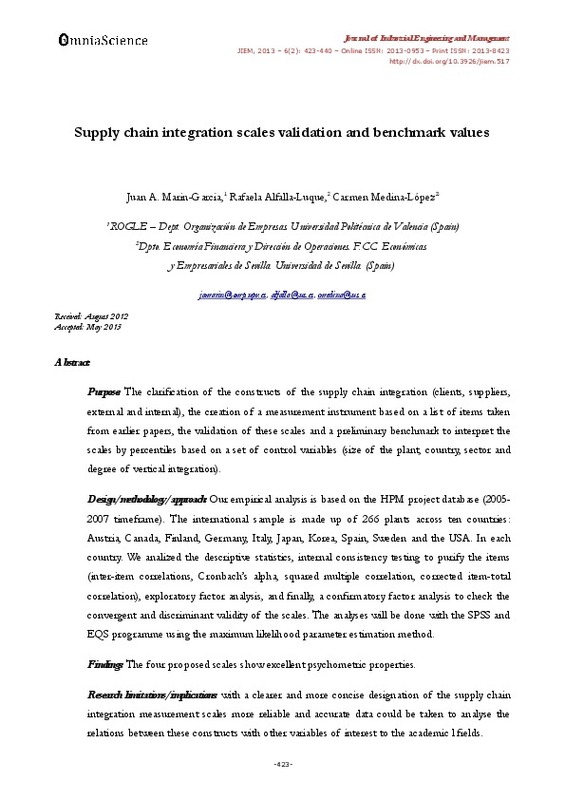JavaScript is disabled for your browser. Some features of this site may not work without it.
Buscar en RiuNet
Listar
Mi cuenta
Estadísticas
Ayuda RiuNet
Admin. UPV
Supply chain integration scales validation and benchmark values
Mostrar el registro sencillo del ítem
Ficheros en el ítem
| dc.contributor.author | Marín-García, Juan Antonio
|
es_ES |
| dc.contributor.author | Alfalla Luque, Rafaela
|
es_ES |
| dc.contributor.author | Medina-López, Carmen
|
es_ES |
| dc.date.accessioned | 2014-12-16T13:06:20Z | |
| dc.date.available | 2014-12-16T13:06:20Z | |
| dc.date.issued | 2013 | |
| dc.identifier.issn | 2013-8423 | |
| dc.identifier.uri | http://hdl.handle.net/10251/45500 | |
| dc.description.abstract | [EN] Purpose: The clarification of the constructs of the supply chain integration (clients, suppliers, external and internal), the creation of a measurement instrument based on a list of items taken from earlier papers, the validation of these scales and a preliminary benchmark to interpret the scales by percentiles based on a set of control variables (size of the plant, country, sector and degree of vertical integration). Design/methodology/approach: Our empirical analysis is based on the HPM project database (2005-2007 timeframe). The international sample is made up of 266 plants across ten countries: Austria, Canada, Finland, Germany, Italy, Japan, Korea, Spain, Sweden and the USA. In each country. We analized the descriptive statistics, internal consistency testing to purify the items (inter-item correlations, Cronbach’s alpha, squared multiple correlation, corrected item-total correlation), exploratory factor analysis, and finally, a confirmatory factor analysis to check the convergent and discriminant validity of the scales. The analyses will be done with the SPSS and EQS programme using the maximum likelihood parameter estimation method. Findings: The four proposed scales show excellent psychometric properties. Research limitations/implications: with a clearer and more concise designation of the supply chain integration measurement scales more reliable and accurate data could be taken to analyse the relations between these constructs with other variables of interest to the academic l fields. Practical implications: providing scales that are valid as a diagnostic tool for best practices, as well as providing a benchmark with which to compare the score for each individual plant against a collection of industrial companies from the machinery, electronics and transportation sectors. Originality/value: supply chain integration may be a major factor in explaining the performance of companies. The results are nevertheless inconclusive, the vast range of results obtained are due, amongst other things, to the fact that there is no exactness to the group of scales used, no-one has yet published an analysis of the measurement models nor clear benchmarks as to the variety of the scales used. | es_ES |
| dc.description.sponsorship | This paper has been made possible thanks to grant DPI2006-05531 (HPM Project-Spain: Project for high performance manufacturing) awarded by the Spanish Ministry of Education and Science and the project “CORSARI MAGIC DPI2010-18243” by the Spanish Ministry of Science and Innovation within the Program “Proyectos de Investigación Fundamental No Orientada”. | |
| dc.language | Inglés | es_ES |
| dc.publisher | OmniaScience | es_ES |
| dc.relation.ispartof | Journal of Industrial Engineering and Management | es_ES |
| dc.rights | Reconocimiento - No comercial (by-nc) | es_ES |
| dc.subject | Scale validation | es_ES |
| dc.subject | Questionnaire | es_ES |
| dc.subject | Reliability | es_ES |
| dc.subject | Validity | es_ES |
| dc.subject | Psichometric properties | es_ES |
| dc.subject | Supply chain integration | es_ES |
| dc.subject.classification | ORGANIZACION DE EMPRESAS | es_ES |
| dc.title | Supply chain integration scales validation and benchmark values | es_ES |
| dc.type | Artículo | es_ES |
| dc.identifier.doi | 10.3926/jiem.517 | |
| dc.relation.projectID | info:eu-repo/grantAgreement/MEC//DPI2006-05531/ES/HPM PROJECT-SPAIN: PROYECTO PARA LA MANUFACTURA DE ALTO RENDIMIENTO (HIGH PERFORMANCE MANUFACTURING)/ | es_ES |
| dc.relation.projectID | info:eu-repo/grantAgreement/MICINN//DPI2010-18243/ES/COORDINACION DE OPERACIONES EN REDES DE SUMINISTRO%2FDEMANDA AJUSTADAS, RESILIENTES A LA INCERTIDUMBRE: MODELOS Y ALGORITMOS PARA LA GESTION DE LA INCERTIDUMBRE Y LA COMPLEJIDAD/ | es_ES |
| dc.rights.accessRights | Abierto | es_ES |
| dc.contributor.affiliation | Universitat Politècnica de València. Departamento de Organización de Empresas - Departament d'Organització d'Empreses | es_ES |
| dc.contributor.affiliation | Universitat Politècnica de València. Grupo de Investigación en Reingeniería, Organización, trabajo en Grupo y Logística Empresarial (ROGLE) | es_ES |
| dc.description.bibliographicCitation | Marín-García, JA.; Alfalla Luque, R.; Medina-López, C. (2013). Supply chain integration scales validation and benchmark values. Journal of Industrial Engineering and Management. 6(2):423-440. https://doi.org/10.3926/jiem.517 | es_ES |
| dc.description.accrualMethod | S | es_ES |
| dc.description.upvformatpinicio | 423 | es_ES |
| dc.description.upvformatpfin | 440 | es_ES |
| dc.type.version | info:eu-repo/semantics/publishedVersion | es_ES |
| dc.description.volume | 6 | es_ES |
| dc.description.issue | 2 | es_ES |
| dc.relation.senia | 253613 | |
| dc.identifier.eissn | 2013-0953 | |
| dc.contributor.funder | Ministerio de Educación y Ciencia | |
| dc.contributor.funder | Ministerio de Ciencia e Innovación |








